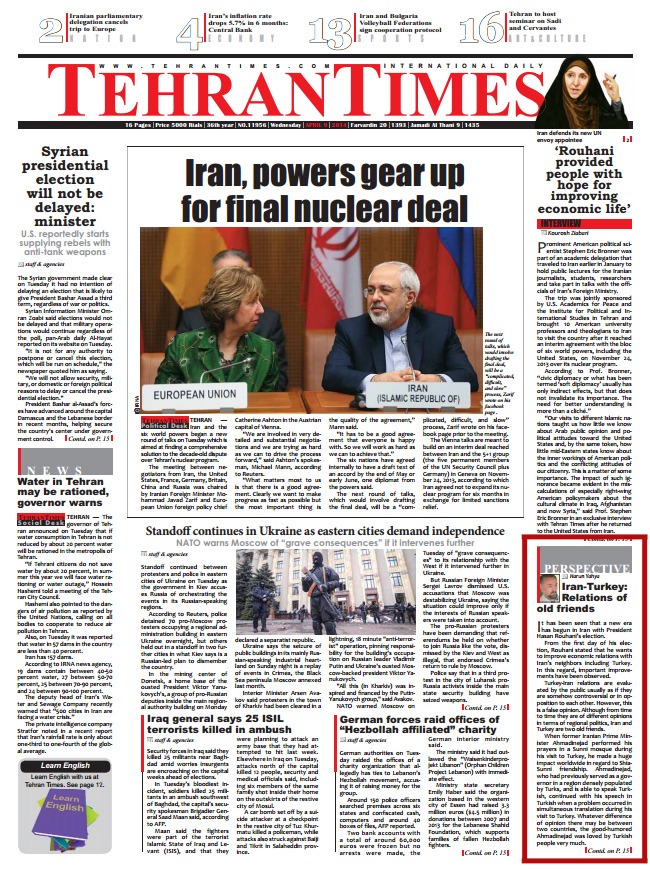
 It has been seen that a new era has begun in Iran with President Hasan Rouhani’s election.
It has been seen that a new era has begun in Iran with President Hasan Rouhani’s election. From the first day of his election, Rouhani stated that he wants to improve economic relations with Iran’s neighbors including Turkey. In this regard, important improvements have been observed.
Turkey-Iran relations are evaluated by the public usually as if they are somehow controversial or in opposition to each other. However, this is a false opinion. Although from time to time they are of different opinions in terms of regional politics, Iran and Turkey are two old friends.
When former Iranian Prime Minister Ahmadinejad performed his prayers in a Sunni mosque during his visit to Turkey, he made a huge impact worldwide in regard to Shia-Sunni friendship. Ahmadinejad, who had previously served as a governor in a region densely populated by Turks, and is able to speak Turkish, continued with his speech in Turkish when a problem occurred in simultaneous translation during his visit to Turkey. Whatever difference of opinion there may be between two countries, the good-humored Ahmadinejad was loved by Turkish people very much.
During the period after Rouhani’s election, diplomatic relations improved further as at least one official visit per month has been realized between Iran and Turkey. Although they support different sides in Syrian civil war, it was shown to the world that positive diplomatic relations could still be carried out between two neighboring countries. The fact that Turkish Republic is a democratic Muslim country has drawn the attention of Iranian intellectuals and Turkey's position carries vital importance for the future of Iran in the international arena.
When we look at the recent past, we see that there has never been any serious tension in Turkish-Iranian relations. During the Persian Gulf War, Turkey and Iran did not experience a significant difference of opinion. After the Persian Gulf war, the presence of U.S. forces (Poised Hammer) located on the Turkish border for the security of the Kurdish population who fled Saddam Hussein’s bloody intervention troubled Iran, but this tension was calmed by Turkish diplomatic efforts. After the disintegration of the Soviet Union, the question of under which country’s influence those newly emerged republics would be created a brief rivalry between two countries: Potential tensions that might have arisen from that rivalry came to an end with Turkish Prime Minister Erdogan’s efforts when the two countries founded the Economic Cooperation Organization in 2003 and established an associate cooperation together with the Turkic States in the Middle Asia.
For two countries, the economy has certainly served as a unifying force. Turkey has become a popular tourist destination for the Iranian people. One of the only countries in the world that the people of the Islamic Republic of Iran can enter without a visa is Turkey. Although Iran is a member of the Shanghai Cooperation Organization, the fact that Iran has such a sociological link with Turkey, even if it does not appear much in the media, shows that Turkey is enhancing its influence on Iran. Turkey shares a border of 454km with Iran and there is a growing border trade. The economic relations between Turkey and Iran have risen rapidly, especially over the last decade: Where the trade volume of the two countries was around 1 billion dollars in 2000, this figure has risen to 10 billion dollars in 2010; in 2012 it has reached 21.8 billion dollars. By the end of 2015, reaching a 30 billion dollar trade volume is among the goals of the two countries. Certainly energy takes the lead in trade agreements and Iran is the number two natural gas provider for Turkey. Another important trade matter is that Turkey gets about 40% of its crude oil needs from its old friend Iran.
Apart from trade, the PKK-PJAK problem can be considered as one of the factors that brought two countries closer to each other. Both countries are struggling against a communist state, that is tried to be legitimized under the guise of “independence of the Kurds”, being founded in their lands. PJAK, which carries out activities in Iran, is well-known as a branch of the PKK. Therefore the two countries moved closer to each other during those long years when they shared intelligence for their operations against these guerilla groups. Although the Syrian civil war, to a certain extent, has affected the sharing of intelligence about border security in a negative way, it is apparent that the risk of the foundation of a communist state keeps uniting both countries around a common cause that cannot be broken. Furthermore, the Turkish Foreign Minister Ahmet Davutoglu’s efforts allowing the issue of Iran’s nuclear program to be diplomatically resolved makes Turkey an important bridge in Iran’s relations with the West.
Another matter that the Turkish side gives importance to is to put an end to sectarian differences; Davutoglu’s suggestion to Iranian Foreign Minister Mohammad Javad Zarif regarding putting Shia places of worship in Syria under protection of the two countries was well received. It was also highly important that Turkish Prime Minister Erdogan gave speeches with no Shia-Sunni discrimination; his foreign policy choices during his last visit to Iran referring to Tehran as “my second home” earned him positive marks from the Iranians. These approaches can be considered as positive steps that have been taken for the two countries not to feel distant with each other, not only in the field of cold general diplomacy but also in terms of warm human relationships.
The relations of Iran and Turkey, both of whom are very important Muslim strategic powers in terms of welfare, peace and development in the region, have been moving forward, and are improving further with every passing day.
Adnan Oktar's article on Tehran Times:


